Month: April 2020
Lana RAZAFIMANANTSOA – Programme Officer, Francophone Africa
Lana RAZAFIMANANTSOA – Programme Officer, Francophone Africa
[tp lang=”en” not_in=”fr”]
Lana is responsible for the AWDF grant management portfolio of French speaking African countries. She liaises with other departments to provide technical assistance, support and expertise to the overall objectives of the organisation.
Lana has more than 15 years work experience in different fields, ranging from administration, project management, advocacy & communication, capacity building, grant-making and MEL. She has also undertaken consultations in the area of humanitarian advocacy and research, ecological & climate justice, SRHR justice, and African feminist movement building. For years, she provided technical support and expertise to various CSO-led, youth-led and women-led justice and activism movements in Africa.
Lana’s educational background is in Human Rights & Gender, Community Development and Communication for Development.
She is a proud feminist, passionate about feminism and its intersectionality. She also promotes values in justice, solidarity and leadership of African women for the full realisation of their rights.
[/tp]
[tp lang=”fr” not_in=”en”]
Lana est responsable du portefeuille de gestion des subventions AWDF des pays africains francophones. Elle travaille en liaison avec d’autres départements pour fournir une assistance technique, un soutien et une expertise aux objectifs généraux de l’organisation.
Lana a plus de 15 ans d’expérience professionnelle dans différents domaines, tels que l’administration, la gestion de projets, la plaidoirie et la communication, le renforcement des capacités, l’octroi de subventions et le suivi et l’évaluation des projets. Elle a également entrepris des consultations dans le domaine de la plaidoirie et de la recherche humanitaire, de la justice écologique et climatique, de la justice SDSR et du renforcement du mouvement féministe africain. Pendant des années, elle a fourni un appui technique et une expertise à divers mouvements de justice et d’activisme dirigés par des OSC, des jeunes et des femmes en Afrique.
Lana a fait des études dans les domaines des droits de l’homme et du genre, du développement communautaire et de la communication pour le développement. Elle est fière d’être féministe et passionnée par le féminisme et son intersectionnalité. Elle défend également les valeurs de justice, de solidarité et de leadership des femmes africaines pour la réalisation complète de leurs droits.
[/tp]
Diaries of African Feminists: Building Emotional Resilience
Diaries of African Feminists: Building Emotional Resilience
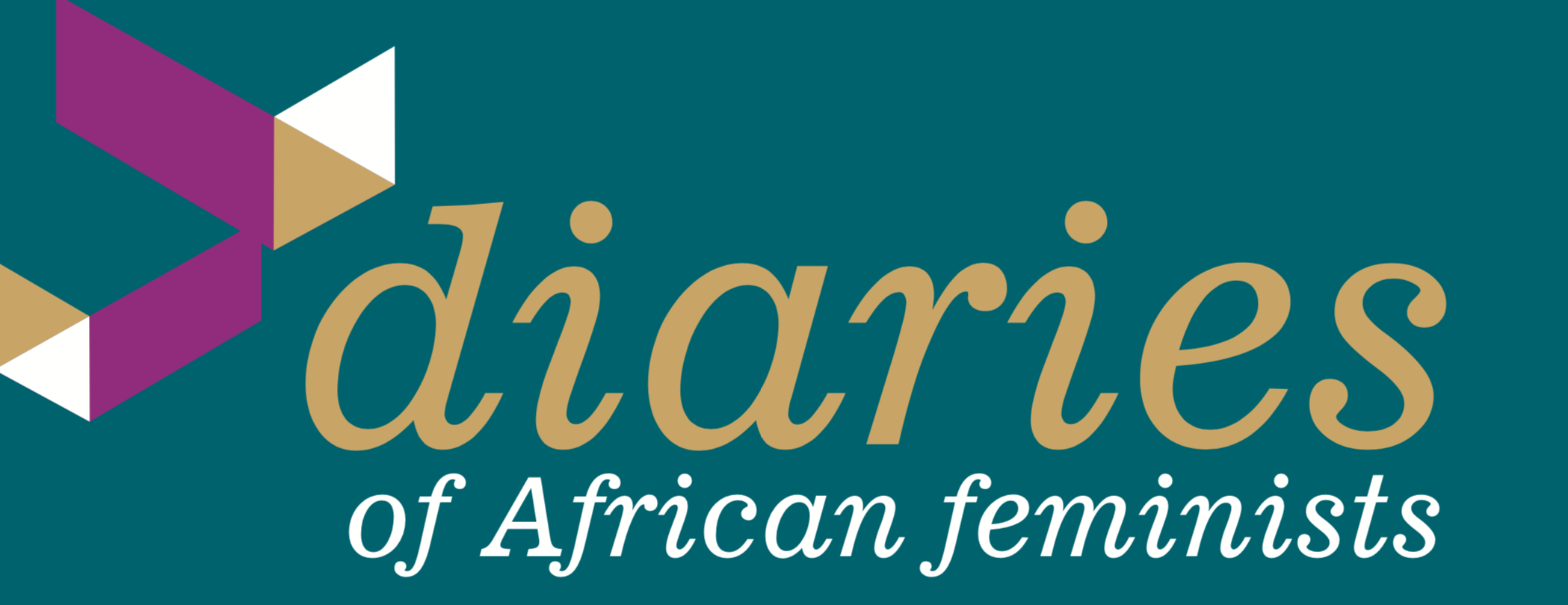
In February of this year, AWDF held its inaugural Flourish retreat, a groundbreaking and much needed space for African feminists to rest, rejuvenate and build emotional resilience. After heading home, participants continued the work with their own energies, building ongoing sisterhood to sustain their activism. Read the stories of seven African feminists living and working in Uganda, sharing their survival techniques for coping in these challenging times of the COVID-19 pandemic.
Read the diaries here
Solidarity in Word and Deed: Translating the African Feminist Charter
Solidarity in Word and Deed: Translating the African Feminist Charter
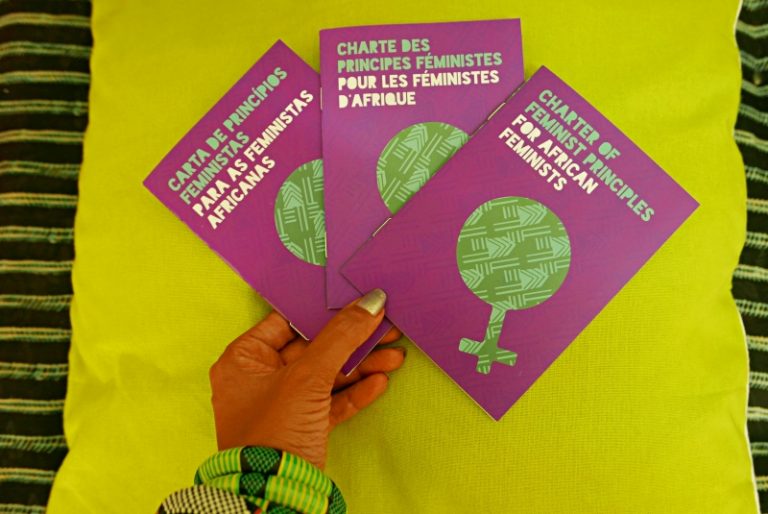
Author: Jessica Horn, AWDF Director of Programmes
It may seem odd to be excited about a publication. However the story of the translation of the Charter of Feminist Principles for African Feminists begs recounting as a tale of inspired collective action.
The Charter itself was developed by the African Feminist Forum Working Group in 2006 and adopted in by over 100 African feminists at the first African Feminist Forum (AFF) hosted by AWDF in Accra that year. The goal was political clarity. Every movement needs to articulate its visions of ethics and collective power-and its political bottom lines. The Charter provided this, and has been used since as a means of bringing feminist activists across generations together to build feminist consciousness, create new feminist spaces and even to help unite women mobilising against religious fundamentalism.
As beautiful as it is, the Charter was written in English- a language spoken by some but not all of Africa’s people. Translating the Charter was imperative. However as is typical in the world of women’s organising, the AFF faced the challenge of funding. What we had not anticipated was the spontaneous action and love that we would receive in the form of voluntary translation by African activists so moved by the Charter that they saw it necessary to make sure the people they organised alongside could read it too.
In its first incarnation, Beninoise feminist and AWDF staff member Rissi Asani-Alabi translated the Charter into French for use in the bilingual AFF regional forums and to aid the creation of national Feminist Forums in Francophone African countries. Using this, Senegalese feminists Fatim Faye and Kura Saar went on to translate the Charter into Wolof, a language spoken widely in Senegal and Gambia. In the revised version additional translation support was offered by Pathé Diagne, one of Africa’s leading linguists and political scientists (who has, notably, also translated the Quran into Wolof).
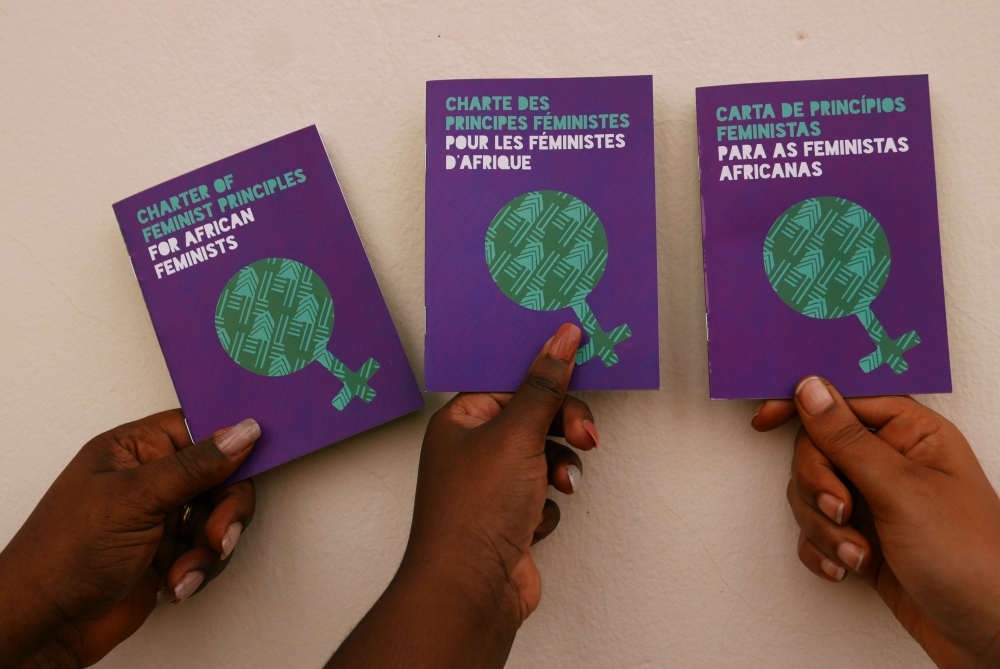
In Tanzania, staff of the country’s leading women’s rights organisation Tanzania Gender Networking Programme translated the Charter into Kiswahili, opening up readership in Central and East Africa and offering feminist discourse in Kiswahili including the term feminism itself and a translation of the concept of ‘patriarchy’ (mfumo dume).
And the feminist love has continued to flow.
On reading the Charter for the first time, Egyptian women’s human rights defender Yara Salaam offered, in typical generous style, to translate the text into Arabic. Her father, poet and translator Refaat Sallam provided proofreading support, making the Charter accessible now to Arabic-speaking feminists across north and northeast Africa and to African feminists in Arabic speaking diasporas.
After returning from the 4th African Feminist Forum in Zimbabwe in early 2016, Angolan feminists Sizaltina Cutaia and Âurea Mouzinho were inspired to revive feminist organising by creating the Ondjango Feminista in their home country. Their first step, working with Florita Telo, was to translate the Charter into Portuguese to allow women in Angola to read and rekindle feminist activism. Through this solidarity, Portuguese translations of the Charters are already in the hands of feminist activists in Angola, Mozambique and Brazil- including with two of Brazil’s ground-breaking women capoeira masters.
This year we have worked with East African feminist graphic designer Lulu Kitololo to create a stunning new redesign of the Charter, producing versions in all of the languages available thus far. For Latin script we used title fonts created by The League of Moveable Type, a self-named leader in the open source font revolution, offering highly designed free fonts. In Arabic, Yara Salaam suggested use of the Amiri font- an open source font project design to revive and digitise an older Arabic typeface.
We often think of solidarity as large public displays. However there is solidarity in these quieter acts of resourcing a movement through knowledge, skills and time. Feminism is not just in the saying, it is in the doing. The process of redesigning and translating the Charter of Feminist Principles has proved that.
Our heartfelt thank you goes to everyone who has participated in making the Charter relevant and accessible to the widest possible audience. We hope you find the new materials useful. And as always, do let us know how you are using them
Download the charter for free:
Envisioning a Feminist Earth: African women lead the way
Envisioning a Feminist Earth: African women lead the way
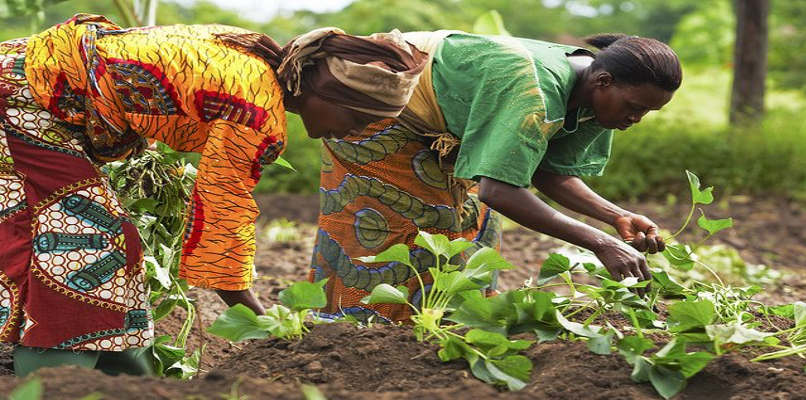
A feminist just earth, as expressed by Bridget Burns of WEDO, ‘is a world centred on recognition and care for ourselves, for others and for mother earth’.
As COVID-19 continues to impact our communities, it is imperative that we actively and consciously devise ways of protecting the health of our planet. The environmental challenges before us today are prompting us to view our development through an environmental health lens. They also highlight the fact that we need to change the way we live, work, relate to one another and interact with the outside world. It is clear that our current development model is unsustainable, and is taking a heavy toll on the earth and her lifeforms. If we continue to take our natural environment for granted and continue to produce, consume and power our lives the way we do now, forests, oceans and weather systems soon will be overwhelmed and rendered incapable of supporting life as we know it.
The lives of the majority of African women, especially rural poor women are closely connected to the environment as a result of their livelihoods being largely dependent on natural resources. In cognisance of this, feminists and women’s rights organisations in Africa have undertaken various innovative and community driven interventions to forestall unsustainable agriculture, fisheries, infrastructure projects, mining and energy. All of these have resulted in unprecedented biodiversity loss, habitat degradation, over-exploitation, pollution and climate change which have negatively affected the livelihoods of rural women.
AWDF is a strong advocate of sustainable livelihoods through women’s innovation and local response and has supported several women-driven local initiatives to address environmental degradation.
CAEPA Cameroon, with support from AWDF, galvanised over 1000 rural women within 6 communities in Bamenda to re-vegetate marginal lands through agro-forestry systems with fast growing tree species. The wood lots serve to enrich soil cover, ameliorate local climate, provide fodder for livestock and energy for cooking. CAEPA Cameroon has also mobilised about 1500 young environmental feminists in 6 schools within Bamenda to join in the re-vegetation drive. As a result, the schools have incorporated re-afforestation in extra curriculum activities and have re-vegetated about 200 hectares of marginal land within their respective communities.
Another partner, Iseguri Initiative in the Oti Region of Ghana has supported rural women smallholder farmers in organic agriculture and agroforestry practices. Over 2000 rural women smallholder farmers have adopted such practices to improve their farming activities, boost their income and rejuvenate marginal land for farming.
African Gender and Extractives Alliance (WoMin) worked tirelessly to strengthen the voices of marginalised women in resource rich communities to advocate against extractives and large-scale infrastructure projects.
African women have always played a critical role in managing natural resources, and are also the most affected by environmental degradation. As a feminist organisation, AWDF believes in the power of solidarity to radically transform our world into a feminist earth. Environmental issues are feminist issues and must be prioritised by all.
Happy Earth Week!
By Rose Buabeng, Programme Officer, AWDF
22/04/2020
Dinnah NABWIRE -Knowledge Management Specialist
Dinnah NABWIRE -Knowledge Management Specialist
[tp lang=”en” not_in=”fr”]
Dinnah Nabwire is responsible for steering institutional initiatives to generate, analyse and utilise knowledge to shape sustainable feminist philanthropy in Africa.
For 10 years, Dinnah has led research, documentation, learning, policy and advocacy for nonprofits with placements in Uganda and Washington DC. Most recently, she led technical collaborations for the research to practice transition of the Uganda Ministry of Gender-led Violence Against Children Survey (VACS). She also managed the establishment of a community-led model learning site in Northern Uganda which was co-created from the VACS data, a corroborative formative qualitative study and lessons from implementing the national INSPIRE strategies’ pilot in Central Uganda.
Dinnah holds a Masters of Gender, Education and International Development from the University College London and a Bachelors’ of Social Work from the Uganda Christian University.
She is a prochoice feminist, passionate about sexual and reproductive health rights for women. She is an everyday Rotarian, a lover of art and a walker.
[/tp]
[tp lang=”fr” not_in=”en”]
Dinnah Nabwire est chargée de piloter les initiatives institutionnelles visant à générer, analyser et utiliser les connaissances pour façonner la philanthropie féministe durable en Afrique.
Depuis 10 ans, Dinnah a mené des études, de la documentation, de l’apprentissage, des politiques et des actions de plaidoyer pour des organisations à but non lucratif en Ouganda et à Washington DC.
Plus récemment, elle a dirigé des collaborations techniques pour la recherche sur la transition de l’enquête sur la violence contre les enfants (VACS), menée par le ministère ougandais de l’égalité des sexes. Fondé sur les données VACS, une étude qualitative formative corroborante et les leçons tirées de la mise en œuvre du projet pilote de stratégies nationales INSPIRE dans le centre de l’Ouganda, elle a également géré la mise en place d’un site d’apprentissage modèle dirigé par la communauté dans le nord de l’Ouganda.
Dinnah est titulaire d’une maîtrise en genre, éducation et développement international de l’University College London et d’une licence en travail social de l’Université chrétienne d’Ouganda. Féministe pro-choix, elle se passionne pour les droits des femmes en matière de santé sexuelle et reproductive. Elle est une Rotarienne active, une amoureuse de l’art et une marcheuse.
[/tp]
Surviving COVID-19: Why we need to listen to African women’s organisations
Surviving COVID-19: Why we need to listen to African women’s organisations
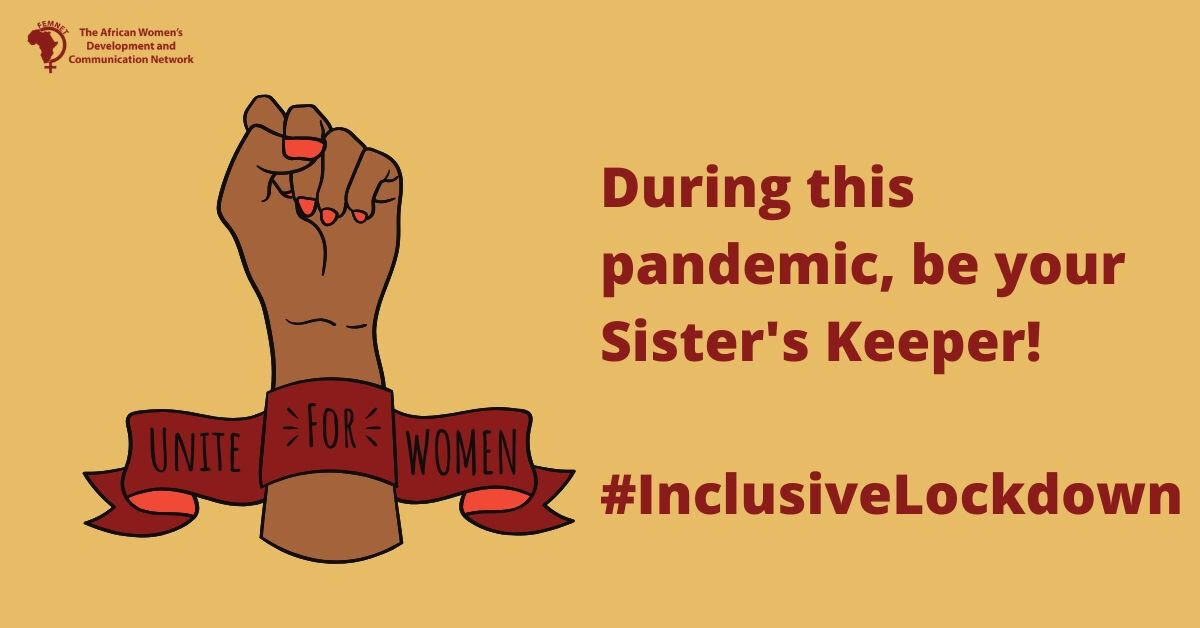
Written By : Jessica Horn
As the threat of COVID19 emerged into full global view, African women’s rights organisations started to raise red flags around what effective responses needed to consider-but would likely leave out. They were prepared. Not with the practicalities of hand sanitisers, virtual work arrangements and food distribution plans, but with the familiarity of what crisis means for women, and the knowledge that if we fail to take into account women’s needs, we are not going to survive this.
Generalised catastrophe may well be the “new normal” for the privileged, but it has been the backdrop of African women’s organising for generations. In the two decades of The African Women’s Development Fund’s operations, our grantees have worked to try to get one step ahead of epidemics such as HIV/AIDS and Ebola, to mobilise to end war in their countries and communities, and pick up the social, political and economic pieces in its aftermath. Beyond headline disasters, grantees have also worked persistently on the quieter but no less deadly threats of economic collapse and everyday economic precarity, and the reality that the patriarchal violence against us as women costs us our emotional and economic wellbeing, and sometimes also costs us our lives.
So it is not surprising that as COVID19 started to touch the continent, AWDF grantees were already outlining a political agenda for the response, warning of possible consequences if we fail to be attentive to the fact that health crises are always gendered. In the words of a press statement issued by the Nigerian Feminist Forum, “it is imperative that we ensure that gender-sensitive responses are implemented, so that the cumulative effect of the current crises are not paid by women, girls and, the most marginalised in IDP camps, rural and urban shanty towns, [the] disabled”. Staff of Southern African advocacy platform Genderlinks flagged in a Mail and Guardian article, that women constitute a majority of health sector workers and domestic workers in South Africa, and also carers in the family- all forms of care labour that increase the risk of exposure to the COVID19. This is a similar truth across the African continent.
As lockdowns and social distancing began to be proposed as a disease control measure, African feminists spoke up to raise concern about the implications and the difficulties, in particular for the most marginalised. In a think piece on social distancing OluTimehin Adegbeye, journalist at The Correspondent and graduate of AWDF’s African Women Writer’s Workshop reflects that for a city like Lagos, “the idea of social distancing is not just alien to us, it is impossible for social and economic reasons too.” Where a majority live in cramped physical conditions, survive through high-contact economic activities like petty trade, and rely on each other for help and shelter, the idea of just staying indoors is simply not viable.
Of equal concern is the patriarchal truth that homes are often not safe for women or girls, and indeed for Lesbian, Bisexual and Transgender women being asked to stay in closer proximity to homophobic and transphobic family members. Grantees like Rape Crisis Cape Town have acted fast on this understanding, expanding their hotline services in anticipation of an increase in violence as women are locked down with their abusive partners. There is also important work to track and make visible new challenges posed by lockdowns for different communities of women. Regional feminist advocacy platform FEMNET have invited African women to share lockdown concerns on Twitter using the hashtag #inclusivelockdown – an ongoing social media discussion that has surfaced real crisis for women with disabilities in particular.
The gendered threats posed by lockdowns and curfews have also come from state authorities. At the start of the COVID19 lockdown in Uganda for example, a number of women’s organisations including grantees Strategic Initiatives for Women in the Horn of Africa (SIHA) and Mentoring and Empowerment Programme for Young Women (MEMPROW) raised the alarm about physical attacks on women street vendors after a Presidential directive around trading in street markets.
In broader view, the COVID19 pandemic shines a global spotlight on the deficits of widespread privatisation of health services across Africa. As Crystal Simeoni, Economic Justice Lead at FEMNET, argues “healthcare requires proper investment horizontally in a way only public sector can provide. It means a holistic approach to healthcare that provides for safe water to wash hands to stop the spread of the disease, it requires doctors that are decently paid and work in safe conditions as well as research that is well-resourced”.
As the pandemic progresses, we remain committed to supporting this agile African feminist response to crisis, aware too that the insights shared by our grantees in this pandemic moment are also setting the compass towards the structural change that needs to be prioritised once the immediate health threat is over.
Jessica Horn is Director of Programmes at AWDF. She tweets @stillsherises
Blog – Pandémie de Covid-19: le moment de renforcer notre sororité en tant que féministes/activistes
Blog – Pandémie de Covid-19: le moment de renforcer notre sororité en tant que féministes/activistes

Ecrit par Ameyo Dekoleadenu – Assistante en Communication, AWDF
Date: 7 avril 2020
Le monde vit actuellement un moment terrible, un moment de chaos total, où nous nous posons diverses questions sur notre futur en tant qu’êtres humains, et aussi sur le futur économique de nos pays. Nous allons au lit chaque jour espérant avoir un lendemain meilleur et nous nous levons réalisant que nos espérances n’aboutissent à rien, sinon un choc total.
La pandémie de Covid-19 n’épargne personne. Ce virus qui ne connaît ni genre, ni nationalité, ni statut social, ce virus non discriminatoire nous laisse ébahi par ses effets négatifs sur l’être humain ainsi que le système économique. Pour nous en tant que féministes/activistes, c’est un moment de réflexion, un moment où nous devons nous poser beaucoup de questions sur nos stratégies de sororité.
A toutes les femmes qui ne vivent qu’au jour le jour et qui, à cause des mesures prises par leurs gouvernements sont en confinement et/ou en quarantaine; à toutes les femmes qui n’ont aucun abri sinon la maison de leurs violeurs et qui n’ont aucun choix que de rester dans ses relations abusives en ce moment terrible; à toutes les organisations de défense des droits des femmes dans le monde et plus spécifiquement en Afrique francophone qui ne cessent d’aider les femmes vulnérables en ces moments de chaos, recevez mes mots d’encouragement. Je nous exhorte en tant que féministes/activistes à nous soutenir les unes les autres d’une manière ou d’une autre dans ce moment terrible. Rappelons-nous surtout que notre sororité ne prend tout son sens et ne devient une réalité que lorsque nous la mettons en pratique. La distance ne doit pas être une barrière entre nous et ne doit en aucun cas nous empêcher de passer des appels téléphoniques juste pour nous encourager les unes les autres et aussi nous informer de la situation que vit l’autre afin de savoir comment lui venir en aide.
Ma prière c’est de voir la fin de cette pandémie le plus tôt possible. Pendant que les experts s’acharnent à trouver une solution durable à ce fléau, protégeons-nous et n’oublions pas de suivre les mesures conseillées par l’Organisation Mondiale de la Santé (OMS).
